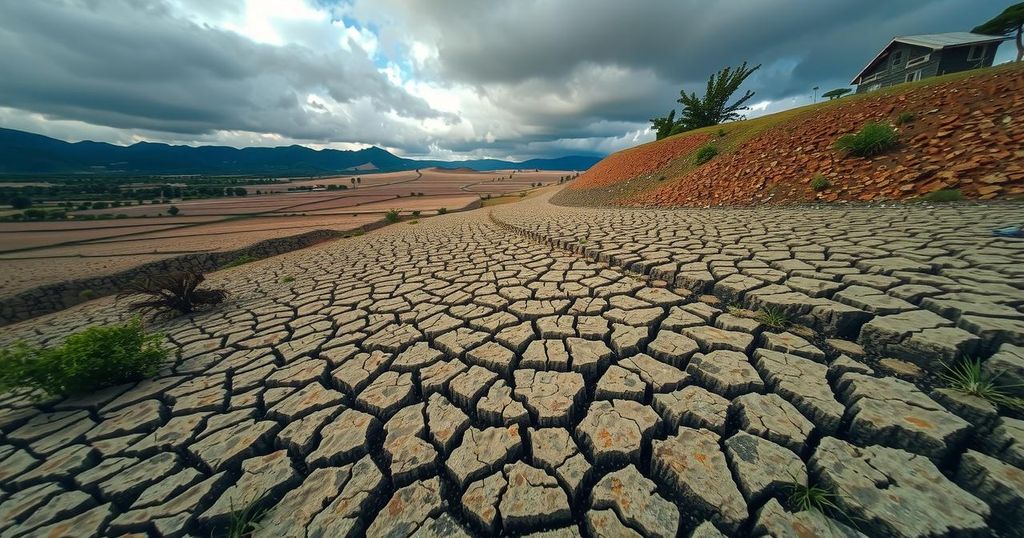Ecuador’s Devastating Drought: A Call for Accountability and Action
Ecuador is experiencing its worst drought in 60 years, resulting in severe wildfires and significant ecological and economic repercussions. This crisis is linked to climate change and mismanagement of local resources. Students and citizens express frustration over the government’s handling of the situation, highlighting the impact on everyday life and the need for a cohesive approach to tackle the underlying causes of climate instability.
Ecuador, a nation renowned for its biodiversity amid a variety of microclimates, has recently been struck by its most severe drought in sixty years, accompanied by widespread wildfires that threaten its ecological balance. The contrasting climates across regions—from the humid coastal areas to the tropical Amazon and the dry Andes—render Ecuador particularly vulnerable to climatic fluctuations. The immediate causes of the current crisis are multifaceted. Experts highlight climate change as a significant exacerbating factor, a concern that was raised during the 2023 presidential debates, emphasizing the necessity for effective drought prevention measures to secure the nation’s energy needs. Nonetheless, local leadership attributes a portion of the disaster to human actions, with Quito’s Mayor Pabel Muñoz labeling the fires as “criminal and terrorist.” Reactions from within Ecuador reflect widespread frustration. Alejandra Baca, an international student, expresses concern about the apparent deliberate nature of the fires, noting the helplessness felt by those far from home. Felipe Rivadeneira, a law student, critiques the municipal government’s response, citing ineffective fire management strategies that have compounded the crisis. Ecuador has experienced dwindling rainfalls since early 2023, adversely affecting agricultural productivity, water reservoirs, and hydropower generation—the latter providing seventy percent of the country’s energy needs. Consequently, scheduled electricity cuts commenced on September 18 to ease the energy strain, severely impacting daily life and economic activities. The Ecuadorian Business Committee reports losses exceeding $12 million USD for each hour of electrical outages, underscoring the economic toll of the crisis. Janice Harvey, a professor specializing in environment and society at St. Thomas University, emphasizes the need to adopt a holistic view of the crisis, where the interconnectedness of droughts, low water levels, and wildfires is recognized. She asserts that climate change should be framed as a systemic issue rather than a series of isolated events. Ultimately, Harvey calls for accountability among industrialized nations, which have historically contributed to global warming through fossil fuel consumption, arguing that Ecuador’s negligible contribution to these emissions should not render it vulnerable to their consequences.
The commentary discusses the ongoing environmental crisis in Ecuador, characterized by a devastating drought that has not been seen in six decades, along with rampant wildfires placing immense stress on the nation’s biodiversity. It explains how Ecuador’s geography, marked by diverse microclimates, complicates seasonal weather predictions and contributes to the severity of the current situation. The article outlines the impact of climate change on local weather patterns and highlights the ineffective handling of the crisis by regional governments, while also addressing the reactions of Ecuadorian students who feel the repercussions of this disaster profoundly. Additionally, it examines the broader implications of such environmental issues in the context of global climate responsibility.
The current environmental crisis in Ecuador, marked by unprecedented drought and rampant wildfires, is a direct result of both climatic factors and human actions. While climate change exacerbates these conditions, local governance and management failures have contributed significantly to the crisis. Ecuadorians face dire economic repercussions from ongoing electrical outages that disrupt daily life and productivity. Discussions surrounding climate accountability emphasize the need for support from developed nations to assist vulnerable countries like Ecuador in addressing these systemic challenges, aiming for a more sustainable future in the face of escalating climate threats.
Original Source: theaquinian.net




Post Comment